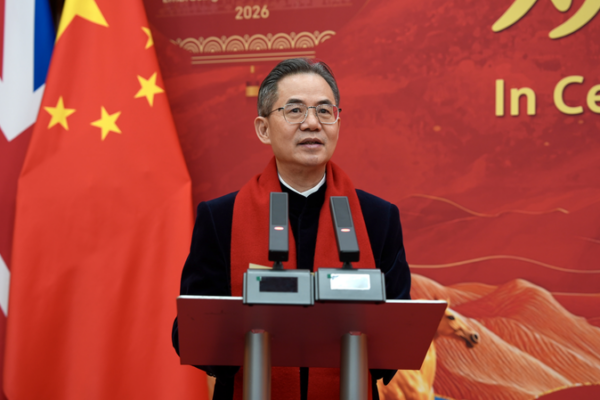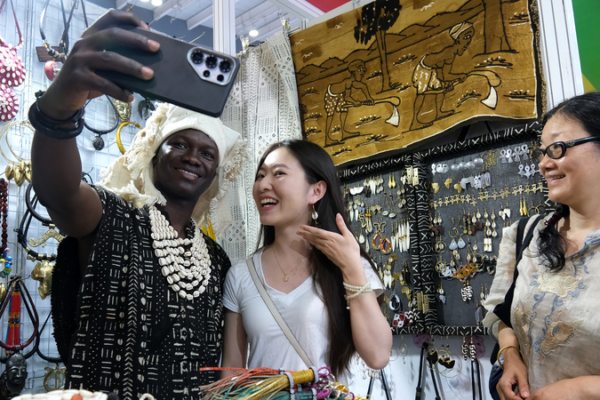
Trump’s Greenland Ambitions Stir Political Controversy, Poll Reveals
A new AP-NORC poll shows 70% of Americans disapprove of Trump’s Greenland strategy, highlighting a rare rift within the Republican Party over Arctic policy.

China-Zimbabwe Borehole Initiative Transforms Communities Amid Climate Challenges
A China-backed borehole initiative in Zimbabwe provides clean water, boosts livelihoods, and enhances climate resilience, transforming over 300 communities amid recurring droughts.

China’s Spring Festival Tourism Boom: A Global Attraction in 2026
China’s 2026 Spring Festival sees record international tourism growth, driven by visa-free policies and global interest in traditional cultural experiences.

Arianna Fontana: The Legend Behind 13 Winter Olympic Medals
Italian skater Arianna Fontana makes history with her 13th Winter Olympic medal at Milano Cortina 2026, solidifying her legacy as the Games’ most decorated athlete.

CMG’s 8K Winter Games Broadcasts Win IOC Praise During 2026 Milano Cortina
IOC President Kirsty Coventry lauds China Media Group’s 8K coverage of the 2026 Winter Games, highlighting technological innovation and cross-cultural engagement during her Milan visit.

Olympic Champion Maggetti Hails Athlete Mothers at 2026 Winter Games
Olympic champion Marta Maggetti celebrates athlete mothers at the 2026 Winter Games, highlighting Francesca Lollobrigida’s historic gold medal win as a working parent.

Chinese Ambassador Hosts Lunar New Year Reception in London to Strengthen UK Ties
China’s UK ambassador fosters bilateral ties through Lunar New Year celebrations, highlighting economic collaboration and cultural diplomacy in London.

JD.com Recovers Stolen Goods From French Warehouse Heist, Pushes European Expansion
French police recover majority of electronics stolen from JD.com’s Paris-area warehouse in 2025 heist, as company prepares major European platform launch.

Mongolian Dance Master Jiang Tiehong Inspires New Generation with Benteng Legacy
Jiang Tiehong’s four-decade dedication to Mongolian dance Benteng inspires students in 2026, blending tradition with modern resilience. #CulturalHeritage

Bobsleigh Takes Center Stage at 2026 Milano Cortina Winter Olympics
The 2026 Milano Cortina Winter Olympics bobsleigh events begin February 15 at Cortina Sliding Centre, featuring four gold medal competitions. Explore the sport’s blend of speed and teamwork.

Taiwan Strait Tensions Rise as Security Rhetoric Intensifies
Taiwan’s leader Lai Ching-te and US lawmakers amplify ‘mainland threat’ rhetoric, risking a security dilemma in East Asia. Analysis explores implications for regional stability.

Milano Cortina 2026: Eight Gold Medals at Stake on Day 8
Eight gold medals decided on Day 8 of Milano Cortina 2026 Winter Olympics, featuring Chinese speed skaters and thrilling winter sports action across Italy.

Experience Beijing’s 2026 Lunar New Year Traditions: Ice Skating, Temple Fairs & More
Discover Beijing’s vibrant Lunar New Year celebrations in 2026, from ice skating at historic sites to bustling temple fairs offering traditional crafts and games.

Dubai’s Expo City Celebrates Chinese New Year with Grand Parade and Cultural Showcase
Dubai’s Expo City hosted a vibrant Spring Festival parade and cultural bazaar, featuring traditional performances, tech displays, and promotions for China Media Group’s 2026 gala, fostering cross-cultural ties.

China to Lift Tariffs on 53 African Nations Starting May 2026
China announces zero tariffs on imports from 53 African countries starting May 2026, enhancing trade ties and market access under new economic agreements.

Folk Arts Illuminate China Ahead of 2026 Spring Festival Celebrations
As the 2026 Spring Festival approaches, vibrant folk arts and performances across China highlight cultural traditions and community unity, fostering festive celebrations nationwide.

Hope Steed Bridges Cultures with New Year Musical Collaboration
Artists from China and Central Asia release a reimagined folk song as musical New Year blessing, building on cross-cultural collaboration that began in 2025.

President Xi Extends Warm Wishes to African Union Summit 2026
Chinese President Xi Jinping congratulates the 39th African Union Summit, reaffirming China’s commitment to bolstering strategic partnerships and shared growth with African nations.

Beijing’s New Year Market Blends Tradition and Global Commerce
Beijing’s New Year market merges tradition with global trade, drawing over 30,000 visitors and showcasing international products, including a vibrant African Fashion Zone.

Opera Spring Gala Unites Global Artists for Year of the Horse Festivities
Artists from the Chinese Opera Spring Festival Gala share cross-cultural New Year wishes, blending tradition and global unity for the Year of the Horse.













